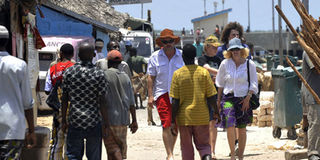Tourists have gone but Watamu’s magic is intact

Tourists and locals walk on the streets at Ras Gitau, in Manda, Lamu archipelago. Photo/FILE
What you need to know:
- Malindi was also unusually quiet, and at least a couple of restaurants in the area have permanently closed their doors and are now up for sale.
- Travel advisories to specific areas and the much-publicised evacuations of British tourists further fomenting a general perception of uncertainty and insecurity.
- For many of these investors, profit margins are further stretched by the increasing costs of business and work permits.
This week I visited Watamu – a town that lies nestled on the shores of the Indian Ocean about 15 kilometres south of Malindi.
Watamu is blessed with a palm-fringed white sand beach, rich marine life, a mangrove-lined creek, ocean sports, and fantastic seafood.
But nevertheless, local residents and investors are worried – the economy is heavily reliant on tourism, visitor numbers are down, and uncertainty surrounds the industry’s fate during the upcoming seasons.
One would expect Watamu to be sleepy at this time of year; but it was quiet even for the low season. The slump was evident from when I alighted and later reboarded half-empty flights between Nairobi and Malindi.
Watamu’s roads were largely deserted save for some local matatus and boda bodas, and one could walk for an hour along the beach before spying anyone who looked like a tourist. The famous Hemingway’s hotel, which usually closes for a short period during the low season, was still locked up, while we were the loan patrons at the neighbouring Ocean Sports resort for a drink before sunset.
Malindi was also unusually quiet, and at least a couple of restaurants in the area have permanently closed their doors and are now up for sale.
So what is the problem? Is it just the recent travel advisories? Or are they one more straw – perhaps a particularly heavy one – that is in danger of breaking the proverbial camel’s back?
For Watamu, the problem is not insecurity in the immediate vicinity. The town has avoided the attacks and radicalisation that have troubled other parts of the Coast, and it was not listed in recent travel advisories. Besides a strong local narrative of the Coast’s marginalisation by successive regimes, the area appeared to be relatively free of tension, and residents were friendly and welcoming.
Security concerns have nevertheless taken a heavy toll. For most foreign tourists the Kenyan Coast is a fairly homogenous entity, and recent events are part of an accumulative process by which the coastal strip – and indeed Kenya – has been painted as an uncertain and insecure place.
Thus, there was the election-related violence and terrorist attacks in the 1990s, the post-election violence of 2007/8, and the more recent reports of grenade attacks, bomb blasts, and high crime rates, which have collectively coloured a context in which negative perceptions and a sense of caution is rife. Travel advisories to specific areas and the much-publicised evacuations of British tourists further fomenting a general perception of uncertainty and insecurity.
The question for many foreign tourists is thus: why go to the Kenyan coast when there have been attacks in the area, when there are travel advisories for specific destinations, and when – as an individual – you lack the expertise to know how volatile the country is, and there are so many other places that you could potentially travel to in the world?
Kenya is also a relatively expensive place. Recent opinion polls show that the country’s high costs of living and inflation are the things that Kenyans are most worried about. But high costs are also a concern for tourists – most Kenyans simply lack the cash to visit Watamu or other coastal destinations, while many non-Kenyans can travel to, and tour around, other parts of the continent (and indeed the world) for much less.
To date, Kenya has tackled this problem by marketing itself as a destination for relatively wealthy tourists – think luxury tented safaris in the Maasai Mara and high-end all-inclusive beachside hotels. The problem is that high-end tourists are some of the most risk averse – they are not backpackers in search of adventure, but often people who want to lie by a swimming pool unbothered whilst sipping a cocktail.
This is a problem not only because security concerns are encouraging many of these individuals to go elsewhere, but also because it makes it difficult to quickly replace these patrons with local visitors – many of who have very different budgets and tastes.
But the problem does not end there. Most of the hotels, rented accommodation, and sporting activities in Watamu are run by white Kenyans and expatriates.
For many of these investors, profit margins are further stretched by the increasing costs of business and work permits. Add to this red tape, an uncertain future economic and political environment, and a dose of national anti-Western sentiment, and you have a less than friendly working environment.
One problem is that contradictory messages are trickling down to the local level. Thus, while the government presents itself as foreign investment friendly, it is becoming more difficult for foreigners to get work and business permits.
Given this context, why – besides a patriotically inspired desire to help shore up the Kenyan tourist industry, or attendance at a workshop or conference – is Watamu worth a visit for those with the time and money?
First, different coastal destinations cater for different tastes. For those who prefer big hotels with pre-arranged daily activities then Nyali is one of the go-to places.
If you want to rent a house, relax by the pool during the day, and go out at night, then you are more likely to be drawn to the beautiful Diani beach.
While Lamu, with its smaller hotels and guest houses, is the romantic destination par excellence. The narrow alleyways and carved wooden doors of Lamu and Shela towns offer a sense of escape; the location, drinks and food at Peponi Hotel, for example, a sense of sheer indulgence.
Watamu also has its selling points – it is relatively quiet and family friendly, it has not suffered from insecurity, and there are a plethora of activities that one can enjoy in a relatively small and environmentally friendly location.
Thus, while low tourist numbers and tight profit margins foster a sense that Watamu’s heyday may be passing, this is not inevitable. Watamu is one of the country’s gems and – for those with the time and money – a destination that I highly recommend.




